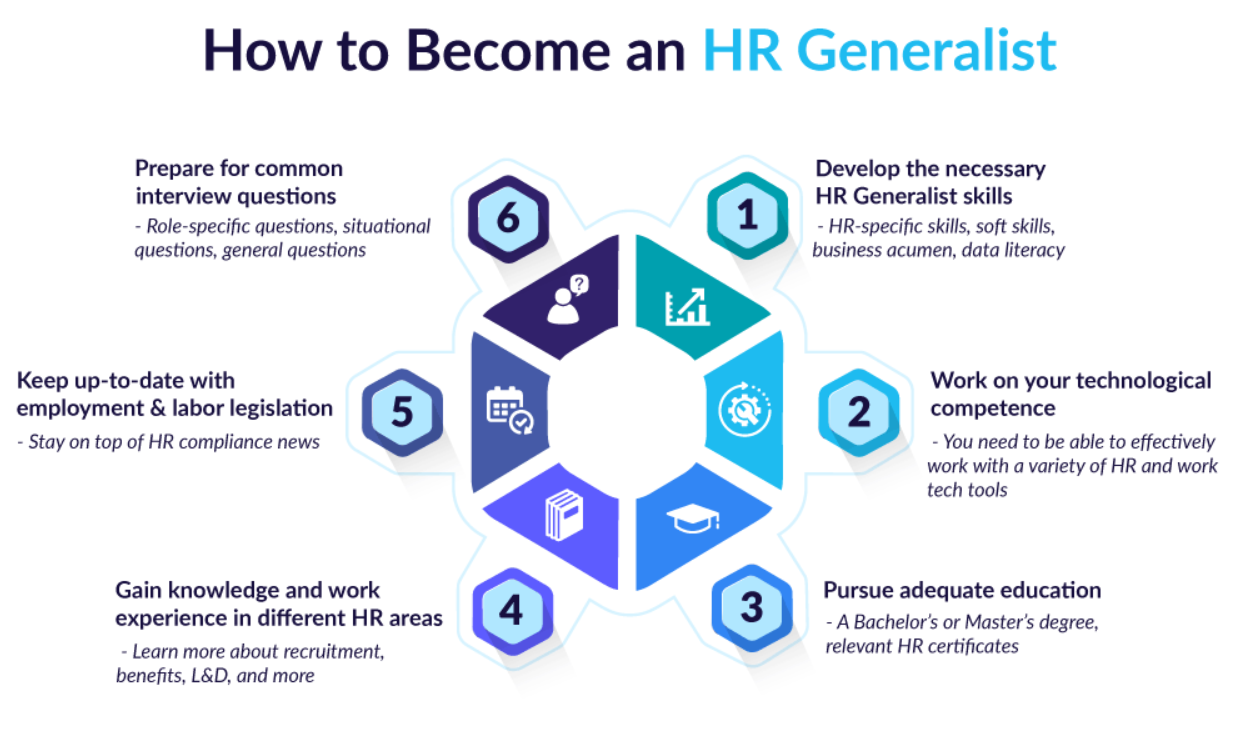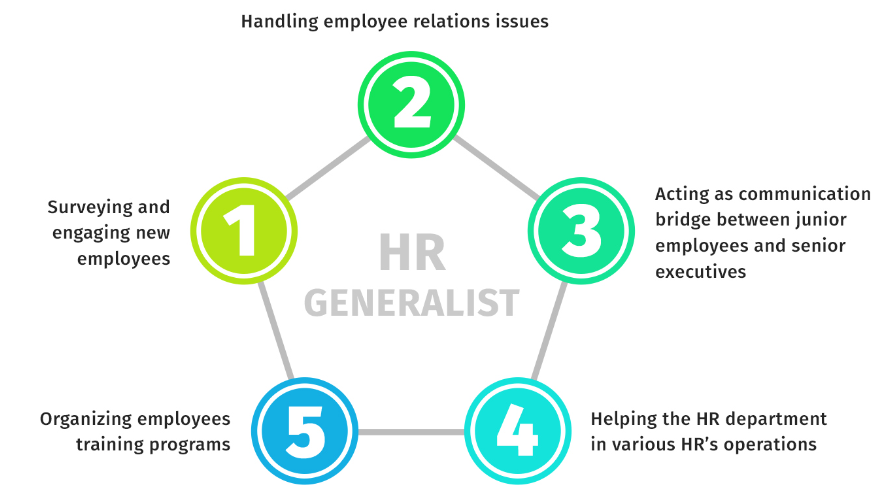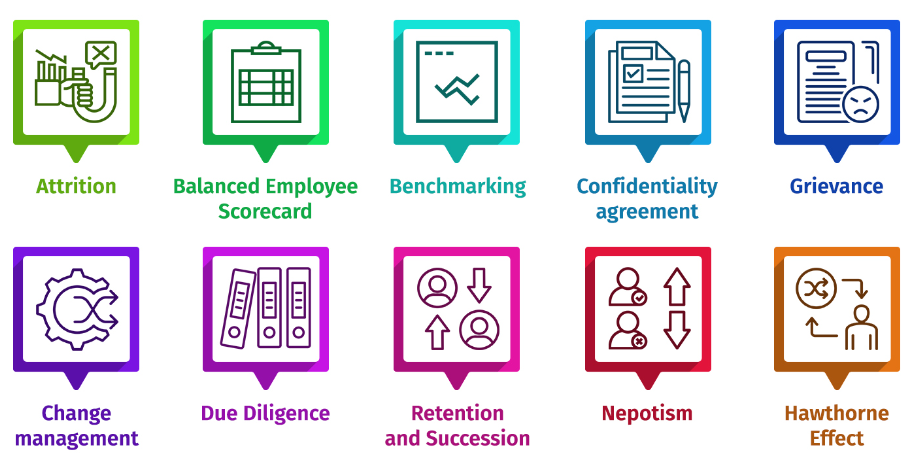In today’s business world, the role of human resources (HR) is more important than ever before. HR professionals are responsible for a variety of functions, from recruitment and selection to onboarding and training. They also play a crucial role in developing and maintaining an organization’s culture.
One of the most important roles of HR professionals is that of HR generalist. HR generalists are responsible for providing support in all areas of HR, from recruitment and selection to performance management and employee relations.
In this article, we will take a look at the importance of HR generalists in an organization. We will also examine the skills and qualities that are essential for success in this role.
What is an HR Generalist?
An HR generalist is a professional who is responsible for providing support in all areas of HR. Examples of tasks include recruitment and selection, onboarding new employees, providing training, resolving employee relations issues, ensuring compliance, and more. In short, they are responsible for the overall operations of HR.
An HR generalist is a vital part of any organization. They are responsible for providing support in all areas of HR and ensuring that the organization’s policies and procedures are followed. HR generalists have a crucial role to play in maintaining the organization’s culture and ensuring that everyone is treated fairly and equitably.
What is the HR Generalist Position and Why is it Important in an Organization?
HR Generalists are responsible for a range of HR responsibilities, which can include recruiting, performance reviews, onboarding, training and development, employee relations, and human resources administration. They work with managers across departments to ensure everyone in the organization is compliant with HR policies and procedures, and they help to smooth the employee journey.
HR Generalists have a critical role to play in an organization. By providing guidance and support to employees throughout their careers, HR Generalists help to ensure a positive working environment that supports success on the job.
How Does One Become a Generalist in HR?
To become a generalist in HR, there are numerous routes one can take. You can study industrial and organizational psychology, pursue a degree in business with a human resources specialization, or concentrate on organizational behavior, or a related topic, and add on-the-job training to your academic preparation.

An HR generalist manages all matters relating to people. It’s a job that will never become dull because the duties are so varied. A competent HR Generalist can establish the company’s culture and guarantee legal compliance.
Key Duties an HR Generalist Performs
According to the BLS, the HR Generalist is one of the most in-demand occupations in the United States. Here are three key duties that an HR Generalist performs.
- Lead or coordinate human resource functions across an organization or corporate unit.
- Provide advice and counsel on all labor-related matters to employees, managers, and Supervisors.
- Represent and protect the interests of workers in any legal or extralegal disputes.

If these duties sound like they aligned with your career goals, then keep reading! This article provides more information on what an HR Generalist does, as well as tips on how to secure this coveted position. So if you’re looking for a new challenge in your career, consider becoming an HR Generalist!
HR Generalist Responsibility
HR Generalists play an important role in companies by providing leadership and direction for human resources. This includes responsibilities such as managing human resources information systems, creating and enforcing policies, training and development, employee relations, and much more. HR Generalists must be proficient in several different areas of HR to succeed in their role.
The responsibilities of an HR Generalist are quite varied. They include:
- Recruitment and Selection: The HR Generalist will be responsible for the sourcing, screening, and interviewing of job applicants, as well as for verifying credentials and making hiring decisions.
- Onboarding New Employees: The HR Generalist will oversee onboarding processes for new hires, as well as provide orientation to ensure successful integration into the organization.
- Employee Relations: The HR Generalist will be responsible for creating and maintaining a positive, productive, and respectful workplace. They will handle complaints and grievances, resolve conflicts, provide disciplinary measures, and protect the rights of employees.
- Training and Development: The HR Generalist will provide existing employees with support and resources to develop their skills and competencies, as well as provide new hires with the necessary skills and training.
- Performance Management: The HR Generalist will monitor employee performance, set expectations and objectives, provide feedback, and conduct performance reviews.
- Compliance: The HR Generalist will be responsible for ensuring that the organization is compliant with all HR-related laws and regulations.
- Payroll: The HR Generalist will handle payroll processing, including data entry and payroll auditing.
The role of HR generalists is to ensure that HR-related operations run smoothly and that employees are treated fairly and equitably. They should also have a keen focus on productivity and efficiency, and provide guidance.
What You Need to Do to Become an HR Generalist
Let’s think about what it takes to become an HR generalist now that we understand what they do.
Employers seeking HR generalists typically look for the following:
- Several years of expertise in the human resources field
- Working knowledge of HR processes such as benefits administration and new hire issue-solving
- Knowledge of labor law and employment law
- Knowledge of HRIS in practice
- Superior communication abilities
- HR certifications like PHR, HRCI, or SHRM Basics
- For the position of HR Generalist, the majority of employers require at least a bachelor’s degree as an eligibility requirement.
How Can an HR Generalist Help Your Organization?
HR Generalists provide a wide range of services to organizations. They can help you:
- Identify and meet staffing needs: HR Generalists can help your organization determine the type and number of employees needed to meet your business objectives.
- Develop recruiting processes: HR Generalists can create clear and effective recruiting processes to ensure your organization is attracting the best talent.
- Increase employee engagement: HR Generalists can help you understand and improve the employee experience. They can also provide guidance on how to recognize and reward employees for their performance.
- Improve productivity: HR Generalists can devise strategies to increase employee productivity, such as implementing flexible working hours and introducing new technologies.
- Ensure compliance: HR Generalists can help your organization stay current on labor laws and regulations, including those related to wages, hours, and benefits.
- Create a positive culture: HR Generalists can develop policies and procedures to ensure your organization has a team-oriented and productive work environment.
By having an HR Generalist on board, you can be certain that your organization is maximizing its human capital to achieve its goals.
HR Generalist Technical Term
Here are some of the HR generalist technical terms that you must be familiar with.

Conclusion
In conclusion, the HR generalist is an extremely valuable asset to hold in an organization. They can bring a blend of skill, knowledge, and expertise which can aid in the growth of the organization in terms of productivity, employee engagement, and overall success. With the right qualifications and experience, an HR generalist is poised to lead companies and organizations in the correct direction.
Follow The Corporate Demands for more information.
Check Importance Of HR In An Organization.

